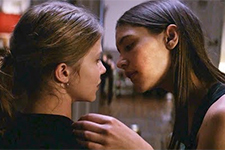Thelma
|  Joachim Trier’s Thelma is a moody supernatural drama centered on a college freshman whose experiences venturing from the nest of her sheltered conservative Christian upbringing crack open the gates of paranormal abilities that she has long repressed. The nature of those abilities is left tantalizingly vague for most of the film, although we suspect that her abilities harbor real danger and darkness. Trier brilliantly conveys this fear in the film’s bravura opening sequence, in which the protagonist as a six-year-old is out hunting in the frozen Norwegian wilderness with her taciturn father, who at one point turns his rifle on the unaware girl and considers shooting her in the head before losing his nerve. It’s a moment that is genuinely heart-stopping, and nothing in the rest of the film quite approaches its power. This is not to say that the rest of Thelma lacks in either power or intrigue. Rather, quite the opposite. Trier’s evocative and often beautiful film maintains a subtle tension that at various points explodes (in one scene involving a shattering window, quite literally) into fits of violence, both emotional and physical. Thelma, the titular protagonist, is poignantly played by Eili Harboe (The Wave) as a young woman who is = searching for her footing in a world that is quite alien to her. Having been raised in the rural west coast of Norway, the bustling (and secular) world of the University of Oslo, where she is studying biology, is almost otherworldly (we first see her in an extreme long shot that gradually moves in and picks her out from the crowd of students moving between classes). She is shy and keeps to herself, although she eventually draws the attention of Anja (Kaya Wilkins), a fellow student with whom she connects and begins to develop intense emotional and physical desire. This emerging sexuality is fraught with all manner of fear and guilt, as Thelma’s strict religious upbringing, embodied by her stern but loving father (Henrik Rafaelsen), would render such same-sex desire intolerable. The tension between Thelma’s desire and the restrictions under which she continues to live are physically embodied in a series of epileptic-like episodes that strike her at seemingly random times; a doctor later diagnoses them as “psychogenic non-epileptic seizures—a physical reaction to mental suppression.” It’s not hard to guess what that mental suppression is, although its true nature and the horrors it has wrought in Thelma’s past provide the film with its most profoundly unnerving and deeply sad moments. Trier, who first gained recognition with the dramas Reprise (2006) and Oslo, August 31st (2011) and made his English-language debut with Louder Than Bombs (2016), has a commanding control of tone and atmosphere, and if Thelma has a weakness, it is that his style at times outmatches the story, which, despite several unsettling revelations, is a bit slight. Cinematographer Jakob Ihre, who shot Trier’s previous two films, works the familiar terrain of moody desaturation and subtly ominous camera movement, although there are several genuinely striking images, including that lyrical opening hunting sequence on a desolate frozen lake and a dream in which Thelma finds herself entrapped in a swimming pool (water and drowning are prominent thematic visuals throughout the film). The connection between budding female sexuality and supernatural ability was arguably best explored and exploited by Brian De Palma in his 1976 adaptation of Stephen King’s Carrie, but Trier has no interest in De Palma’s garish mixture of the teen-gothic horror and grotesque social comedy. Rather, he and his regular co-screenwriter Eskil Vogt are working directly in the sturdy vein of European art film, which means that Thelma has a heady, hushed quality that ensures that its horrors are always in the service of something that is provocative and cerebral and always held at a slight distance. Copyright © 2017 James Kendrick Thoughts? E-mail James Kendrick All images copyright © The Orchard |
Overall Rating: 

 (3)
(3)


